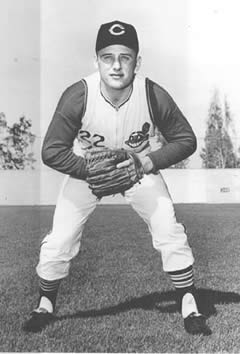In the summer of 1963, I was six years old, and I already loved baseball. I loved playing it, watching it on television, listening to it on the radio, and reading books and newspaper stories about it (I learned to read at an absurdly early age).
That summer, I loved being a Cleveland Indians fan. My parents took me to my first Indians game the previous summer, but I’d be lying if I said I remembered anything whatsoever about attending that game. I do, however, have some rather vivid memories of things that happened to the Indians in 1963. During the five-week span between June 27 and July 31 of that year, four things happened during Indians games which I’ve remembered my entire life. I’ll be devoting a post to each of these events in the days to come.
The first thing happened against the Boston Red Sox at Fenway Park on June 27, although I didn’t learn about it until the next day. My father was born in Salt Rock, West Virginia, a little unincorporated town about 20 miles southeast of Huntington. When I was a boy, our family would visit my grandmother and my uncles in Salt Rock once or twice a year.
My grandmother had a subscription to the Huntington Herald-Dispatch, the morning daily. She lived on a farm in a log cabin on a hilltop a few hundred yards from the nearest paved street. Her mailbox and newspaper boxes were at the end of the dirt driveway which led to the cabin. Each morning one of my uncles would get up and make the walk to the newspaper box to get the paper.
On the morning of Friday, June 28, 1963, I got up out of my guest bed and made my way to the kitchen, where my grandmother had prepared, as she did every day, a big hearty farm breakfast–fried eggs, Bob Evans sausage patties, homemade biscuits and apple butter. When my uncle was finished reading it, I grabbed the Herald-Dispatch sports section to see how the Indians had done the day before.
The Indians had done well, defeating the Red Sox by a score of 6-4, thus snapping a four-game losing streak. But to my surprise, the Herald-Dispatch had more than a perfunctory box score–they had an actual story about the game, because something amazing had happened. In the eighth inning, Indians right fielder Al Luplow, who had entered the game as a defensive replacement for starting right fielder Gene Green, ran to deep right center to try to flag down a fly ball off the bat of Red Sox third baseman Dick Williams.
Cleveland Plain Dealer sportswriter Bob Dolgan tells what happened next: “Luplow flashed toward the fence. Going full speed he leaped high at the fence. He jumped so high that his knees cracked the top of the five-foot barrier. The spring carried Luplow over the fence and as he flew through the air he stuck up his glove and the ball went in it. The force of Luplow’s momentum carried him over the fence. He landed on his shoulder in the Boston bullpen.”
Writing about the catch for Sports Illustrated 22 years later, Jay Feldman noted that first base umpire Joe Paparella made the call: “Luplow’s feet were still in the playing territory when he caught the ball. He had possession of the ball after he fell into the bullpen, and he came back up with it. It was an out. There was no question about it.”
Even though I was only six years old at the time, I knew enough about baseball to know that this was something that didn’t happen every day, or every season. To me it was the most incredible thing I’d ever heard of. It was as though Al Luplow had turned into Superman. From that moment on, Al Luplow was my favorite Indians player, right up until the Indians reacquired Rocky Colavito in 1965.
Luplow was sold to the New York Mets after the 1965 season. He played for the Mets in 1966 and part of 1967, when he was sold to the Pittsburgh Pirates. His last game in the majors was on September 26 of that year, when he was used as a pinch-runner. He was stranded on first base when the inning ended. Later Luplow ran a tavern in his hometown of Saginaw, Michigan, where, as far as I’ve been able to determine, he still lives today.
Dick Williams, the man who was robbed of a homer by Luplow’s amazing catch, had a successful post-playing-days career as a manager, winning the American League pennant for the 1967 Boston Red Sox in his first season at the helm. He managed the 1972 and 1973 Oakland A’s to World Series titles, and his 1984 San Diego Padres won the National League pennant. In 2008, Williams was inducted into the Baseball Hall of Fame as a manager. He died this past July at the age of 82.
Coming up in the next installment: Early Wynn gets his 300th career victory.




I’m embarrassed to admit it, but I don’t even remember Al Luplow.